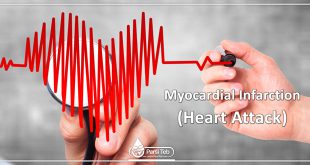This factsheet is for people who are being tested for a heart condition, or who would like information about such tests. A doctor may suggest one or more tests in order to understand the exact cause of symptoms such as chest pain or palpitations (an unpleasant awareness of your heartbeat, …
Read More »arrhythmia
Arrhythmia (palpitations) This factsheet is for people who have an arrhythmia, or who would like information about it. An arrhythmia is a disturbance of the normal electrical rhythm of the heart. Arrhythmias (sometimes called palpitations) may occur continuously or just occasionally. Animation – The different types of arrhythmiaAbout arrhythmias symptoms …
Read More »heart murmur(Overview)
heart murmur(Overview) A heart murmur is an abnormal “whooshing” or “swishing” sound heard with a stethoscope when there is unsteady blood flow near the heart. This sound is different from the usual “lub-dub” heartbeat sound. Heart murmurs can be loud or soft. Most of the time, they are harmless, but …
Read More »heart murmur(Diagnosis)
Diagnosis Typically, heart murmurs are discovered when a physician listens to the heart with a stethoscope during a routine physical examination. If the physician detects any unusual heart sounds, he or she will ask about the patient’s medical and family history and about the presence of any symptoms (e.g., chest …
Read More »A Meeting of Hearts and Minds
A Meeting of Hearts and Minds Every cell of the brain and the heart is held together by a membrane that is rich in fat. Studies show that fish oils — rich in omega-3 fatty acids — may be as effective as conventional drugs in alleviating unipolar and bipolar depression. …
Read More »If you’ve had a heart attack…
Preventing A Second Heart Attack If you’ve had a heart attack, you’re at risk of another. Here’s what you can do to lower that risk. If you’ve had a heart attack, you probably have coronary artery disease. This is the buildup of fatty deposits called plaque in your blood vessels. …
Read More »basic information about heart disease
basic information about heart disease Arteries The heart supplies blood to itself through two coronary arteries and to parts throughout the body through 20 major arteries. These arteries are pliable tubes with thick walls that enable them to withstand the high blood pressure they endure each time the heart beats. This …
Read More »Exercising With A Heart Condition
Exercising With A Heart Condition If you’ve recovering from a heart attack or have been diagnosed with coronary artery disease or congestive heart failure, regular exercise can be a vital part of your therapeutic program. However, this exercise should be tailored to your medical situation. In most cases, you will …
Read More »Myocardial Infarction (Heart Attack)
Myocardial Infarction (Heart Attack) Myocardial infarction (MI) is usually caused by a blood clot that stops blood flow in a heart (coronary) artery. You should call for an ambulance immediately if you develop severe chest pain. Treatment with a ‘clot busting’ drug or an emergency procedure to restore the blood …
Read More » Parsi Teb Physical and Mental Health Journal
Parsi Teb Physical and Mental Health Journal 







